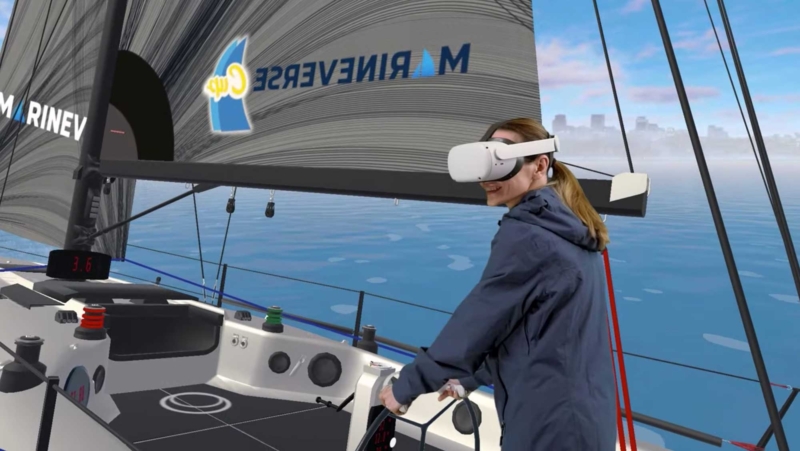PRESS RELEASE
NauticEd Sails into the Future with World-First Virtual Reality Sailing Training
AUSTIN, TX — NauticEd International Sailing Education made history by successfully conducting the world’s first-ever virtual reality (VR) sailing training event, bridging over 3,700 miles between Hawaii and Texas and saving time without sacrificing learning quality.
In a groundbreaking endeavor, a student in Hawaii and an instructor in Austin, Texas were virtually transported aboard the same vessel, set amidst the picturesque Sydney Harbor. For 40 impactful minutes, they engaged in an immersive on-the-water sailing training tutorial, accomplishing what traditionally requires five hours in a real-water environment.
A shortened version of the VR training session can be seen in this video:
MarineVerse, under the adept leadership of Greg Dziemidowicz, has developed a VR sailing technology that doesn’t merely mimic the sailing environment but immerses users into a meticulously simulated, interactive sailing world available on the MetaQuest device. The MetaQuest 2, retailing at a remarkably accessible $299, and its advanced counterpart, MetaQuest 3, available for $499, open the sea of opportunities to aspiring sailors at a fraction of the traditional on-the-water training costs.
NauticEd and MarineVerse partnered up when both companies realized the potential to apply virtual reality to sailing education. MarineVerse had developed a robust sailing gaming environment while NauticEd had developed a globally recognized sailing training platform. “Combining forces allows our VR technology and education platform to transcend geographical and physical limitations, fostering an environment conducive for accelerated learning free from the natural anxieties and fears encountered in the tangible world,” stated Grant Headifen, Global Director of Education at NauticEd.
The success is substantial, confirming a potent proof of concept for virtual reality’s role in effective sailing education. NauticEd, renowned for its innovative methodologies, is officially recognized by the US Coast Guard and adheres to the American National Standards.
Research has consistently indicated that learning in VR can significantly enhance retention and comprehension. A study by PwC found that VR learners were four times faster to train than in the classroom and were 275% more confident to apply skills learned after training. The fear-suppression element in VR — backed by numerous psychological studies — further substantiates the efficiency of VR learning by eliminating fear chemicals in the brain that can inhibit cognitive absorption and skill acquisition. “Now, the biggest fear for the student while training is, instead of the boat capsizing, is just bumping into the couch,” said Headifen – jokingly!
“The virtual sailing session with NauticEd provided an unparalleled learning experience. Maneuvering through the seas and understanding sail trim with shifting wind directions was incredibly intuitive in the VR environment. It was educational, efficient, and exceptionally engaging,” remarked the student, who successfully navigated the virtual seas despite no previous sailing experience.
NauticEd’s commitment to 21st-century sailing education methods permeates its entire curriculum, amalgamating VR technology with interactive multimedia courses and practical on-the-water training via a global network of instructors.
Particularly notable is the newfound accessibility for disabled or aged expert sailors, enabling them to harness their knowledge to teach sailing once more, and monetize their expertise despite physical limitations.
In light of the surging popularity and scientific backing of VR training, NauticEd foresees a future where most sailing students will commence their journey mastering the basics through virtual reality before advancing to real-water training. The MarineVerse VR app can be accessed in MetaQuest either in multiplayer mode together with an instructor or as a stand-alone self-paced training program called “Self-Mastery” where students follow a standardized set of instructions. A more advanced docking and maneuvering in the marina self-training program is also available to students for an extra fee of $100. Considering the cost of a real gelcoat repair or worse from a crash, the device and app costs are small.
Instructors globally need not perceive technology as a threat but as a complementary tool, amplifying their teaching efficacy. Those embracing an integrative training approach, combining VR with real-world applications and multimedia online courses, will likely ascend as the most sought-after professionals in the field, enhancing the ultimate learning experience for students. Headifen suggests that savvy instructors might incorporate a concise 40-minute VR session in the evenings, setting the stage for the subsequent hands-on weekend training on the water. Then complementing this with a VR refresher post the actual on-the-water sailing experience. This ensures students are primed to grasp more intricate sailing nuances – leaving them way ahead of other traditionally trained students.
One of the bigger advantages for students and instructors alike is that the weather for training in VR is always programmed for perfect sailing training conditions. In addition, VR training sessions can be recorded in the MetaQuest app by both the student and the instructor allowing for future review and debriefing.
“As we harness the digital winds propelling us forward, NauticEd is steadfast in our dedication to pioneering, efficient, and accessible sailing education for enthusiasts worldwide. Gone are paper books and proctored paper tests. The future of sailing education is here, and it is virtually limitless,” concluded Headifen.
The Virtual Reality training program can be accessed at:
https://www.nauticed.org/sailing-courses/view/virtual-reality-sailing
About NauticEd International Sailing Education
NauticEd International Sailing Education is a pioneering entity in nautical education, accredited by the US Coast Guard under the EDU-3, American National Standards for sailing training. With a steadfast commitment to developing advanced, accessible, and practical sailing education, NauticEd employs an array of innovative tools, including virtual reality, interactive multimedia courses, and a global network of on-the-water training instructors.
###
For more information, visit www.nauticed.org





